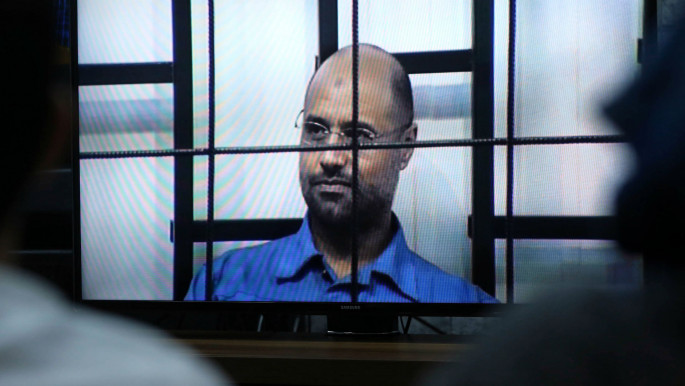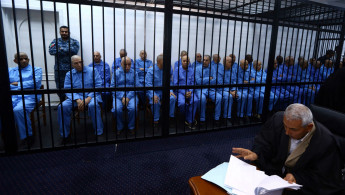Gaddafi loyalists lose lustre in court's dull setting
For all Libya's chaos, there is one constant.
Every two weeks, tens of defendants are presented before a judge at a court in a prison in Tripoli. The defendants are always the same, though their number sometimes vary.
The trial? The prosecution of former Gaddafi-era Jamahiriya officials, most notably (but via satellite) Muammar Gaddafi's son and heir-apparent Saif, and Abdullah Senussi, the late dictator's brother-in-law and intelligence chief.
| He's ill. Physically and mentally. I think he's dead actually. But if he isn't, he will be soon. - Lawyer for the defence |
The procedure is always the same.
First, assembled journalists have three minutes to photograph the 30 former officials of the Libyan Arab Jamahiriya, the official title of Libya under Muammar Gaddafi. In blue overalls they have for the most part lost their splendour. Senussi looks thin and his head is fully shaven.
The faces of the accused are uncommunicative, aged and tired, perhaps as a result of the conditions in the jail they are held, perhaps because of the boredom of yet another day in court. The hearing begins after the photo session.
For two or three hours, lawyers, defendants and journalists drift off occasionally, go for a break, and eventually court is adjourned. Usually, for another fifteen days.
The trial officially began on 14 April 2013. It continues after a long interruption caused by the fighting over the summer of 2014, and despite the political and military instability that is gripping the country.
The charges resemble a long and never-ending litany - assassinations, incitement to rape, and recruitment of African mercenaries - most of which is punishable by death.
Absent from court
In addition to Saif and Senussi, there are a few other 'stars' among the accused. Baghdadi Ali al-Mahmoudi, head of the Jamahiriya government from 2006-2011. Bouzid Dorda, chief of intelligence between 2009 and 2011 and prime minister from 1990 to 1994.
The evidence runs to 4,000 pages, as per a September 2013 press conference by General Seddik al-Sur, head of the state prosecutor's office.
Then there were 38 defendants. Now, after about fifteen hearings, only 30 of them were present for the last session on 25 January.
The reasons for these absences are as varied as they are woolly. In April 2013, the judges discovered that one of the defendants was sent to Tunisia to receive health care. He never returned. "Who gave their permission?" the prosecutor asked in irritation.
Another defendent's absence was explained by his lawyer as a result of illness: "He's ill. Physically and mentally. I think he's dead actually. But if he isn't, he will be soon." Four men are said to have been released "in error".
The most important absentee in this last session is one who has never been physically present in the court room.
Saif al-Islam has not attended his trial since the session of 22 June. Before that, with three fingers missing and a broken tooth, he had been following procedings by satellite from Zintan. That is where the former jet-setter has been detained, like a war chest, since his capture in November 2011 as he attempted to flee Libya.
The 'case' against Saif al-Islam
 |
|
| Saif al-Islam Gaddafi in his last appearance last April (AFP) |
The International Criminal Court (ICC) has been demanding the extradition of Gaddafi's son since his arrest and in 2014, it even brought the subject before the UN. The ICC, it seems, considers Libya able to offer a fair trial to Senussi, but not Saif.
It must be said that the arrest of four ICC employees in Zintan in June 2012 probably did not help Libya's case in this affair. The four were accused of trying to pass documents to Saif al-Islam Gaddafi to help him escape. They were freed after three weeks.
In the meantime, Gaddafi's heir-apparent is still in the hands of the Zintanis. The Bedouin city has been in full conflict with Libya Dawn (Fajr Libya) since July 2014. That particular coalition of fighters also controls the capital Tripoli, which is the seat of its contested claim to running Libya. It is also where the trial is taking place.
The fighting between Libya Dawn and the forces of former general Khalidfa Haftar, Libyan Dignity, might then be one of the reasons for this prolonged absence.
But wild rumours are spreading concerning the fate of Saif. Some, like French journalist Nicolas Beau, claim he was removed from the country in the summer.
Libya Dawn members effectively accuse the Zintanis of being allied to former regime officials. Many Libyans believe that Saif al-Islam Gaddafi and the Zintanis have an agreement in the form of a payment that the Gaddafi sons make in exchange for their protection.
In September 2014, moreover, one official claimed that the forty-year-old had died over the summer after falling ill. The authorities hastily refuted the claim. At the beginning of June, a delegation from the UN had met him and found him to be "in good health given the situation".
No rush to act
Whatever the reality, the judges continue to call up Saif al-Islam Gaddafi at the beginning of each session. The silence that follows does not bother them. They have other priorities, like finding everyone a lawyer – a difficult task in a country where defending Gaddafists is viewed as synonymous as being a Gaddafi sympathiser.
On 27 April 2013, lawyer Ali Dhouba announced to the Court that he no longer wished to defend Senussi "for security reasons". He sported a noticable limp as he rose to the bar that day. He refused however to link between his injury and his decision to stand down. He remains adviser to Dorda and Mahmoudi.
Senussi eventually found another lawyer, Ibrahim Mohamed Abu Isha. He, like the other lawyers, is always demanding more time, to read the dossiers or bring in witnesses.
As yet, no witness has appeared before this court in the heart of the Hadba prison.
Indeed, most of those called as witnesses for the defence are now in Tunisia or Egypt. They are unollilikely to return aware that they were in too deep with the old regime to come back untroubled.
Pleading innocence
The lawyers have all opted for the same strategy: they bring up technical errors and plead the innocence of their clients. Dhouba confirms he "believes in Libyan justice" and that he has "proof and witnesses that will show the innocence" of his clients.
At the hearing on 25 January, two lawyers suggested their clients had only followed orders and were obeying the laws of the country at the time. "If their orders were criminal, they should not have followed them," replied prosecutor Sur.
The accused complain regularly about the conditions of their trial and detention. Dorda, the former chief of intelligence, has never been allowed a pen and paper to ake notes during procedings. Some of his colleagues say they are not allowed to meet regularly with their lawyer.
Ali Nourredine, one of the lawyers, concedes he has only seen his client once, "but that was enough". He said he considered trial conditions "satisfactory". Among the accused, Mabrouk Mohammad Mabrouk says he was tortured to "make me 'confess'".
Another explains that he has been questioned only once on his arrest. Before the court, the accused denied any crimes and completely cleared Dorda, who is regularly cited as the ringleader. As with his co-detainees, he asserted his innocence adn evoked "government orders" without naming names.
It seems that in the prisons of the new Libya, loyalty to - maybe fear of - members of the old regime still holds strong.
This is an edited translation originally published by our partner Orient XXI.



